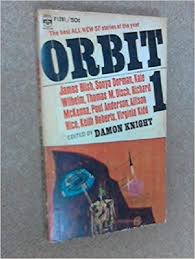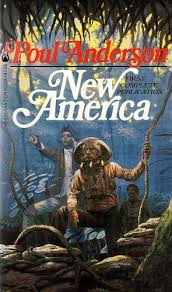Poul Anderson, "To Promote The General Welfare" IN Anderson,
New America (New York, 1982), pp. 117-157.
Dan Coffin:
"'Not everybody on High America succeeded in becoming an independent farmer, a technical expert, or an entrepreneur.'" (p. 131)
Why didn't everyone succeed? Might they have? Coffin continues:
"'There are also those who, however worthy, have no special talents. Laborers, clerks, servants, routine maintenance men, et cetera.'" (ibid.)
So, if everyone had special talents, then everyone would have become an independent farmer, technical expert or entrepreneur and no one need have become a laborer, clerk, servant or maintenance man? Well, no. An economy that is organized around farmers and entrepreneurs requires a smaller number of farmers and entrepreneurs employing a larger number of laborers, clerks, servants and maintenance men. Technical experts can be either independent contractors or higher-salaried employees. The economy has this structure and individuals have these different roles within it whether or not they also have any special talents. One person might have a central role because of their talents or for various other reasons.
Coffin's "...however worthy..." expresses a social bias in favor of holders of central roles who he thinks have special talents. Those who are less talented, according to Coffin, lose their jobs because of automation and then work for lower wages at "'...the bottom of the social pyramid.'" (ibid.) He claims that he is not scoffing at such people. Indeed:
"'Mostly they're perfectly decent, conscientious human beings.'" (p. 131)
Mostly? So some aren't? The same qualification applies to members of every social stratum but here Coffin patronizes wage- and salary-earners.
"'They were absolutely vital in the early days.'" (ibid.)
But now they are less valuable? Surely we need a social ethic and policy that values every member of society through every socioeconomic change?
Coffin spells out what will happen:
more machines and workers;
end of labor shortage;
impoverished masses;
concentration of wealth and power;
growing collectivism;
demagogues preaching revolution;
the rootless well-off applauding the demagogues;
a depersonalized society;
upheavals;
tyranny.
No, it need not end in tyranny, especially if people have learned any lessons from what happened on Earth. Of course some people, whether demagogues or not, will advocate radical social reorganization if wealth and power are concentrated while the masses are impoverished but should such a society just be left as it is?
Coffin says that he means:
"'...to make a damned radical proposal when the convention reopens.'" (p. 135)
So let's read on and find out what his proposal will be.












































